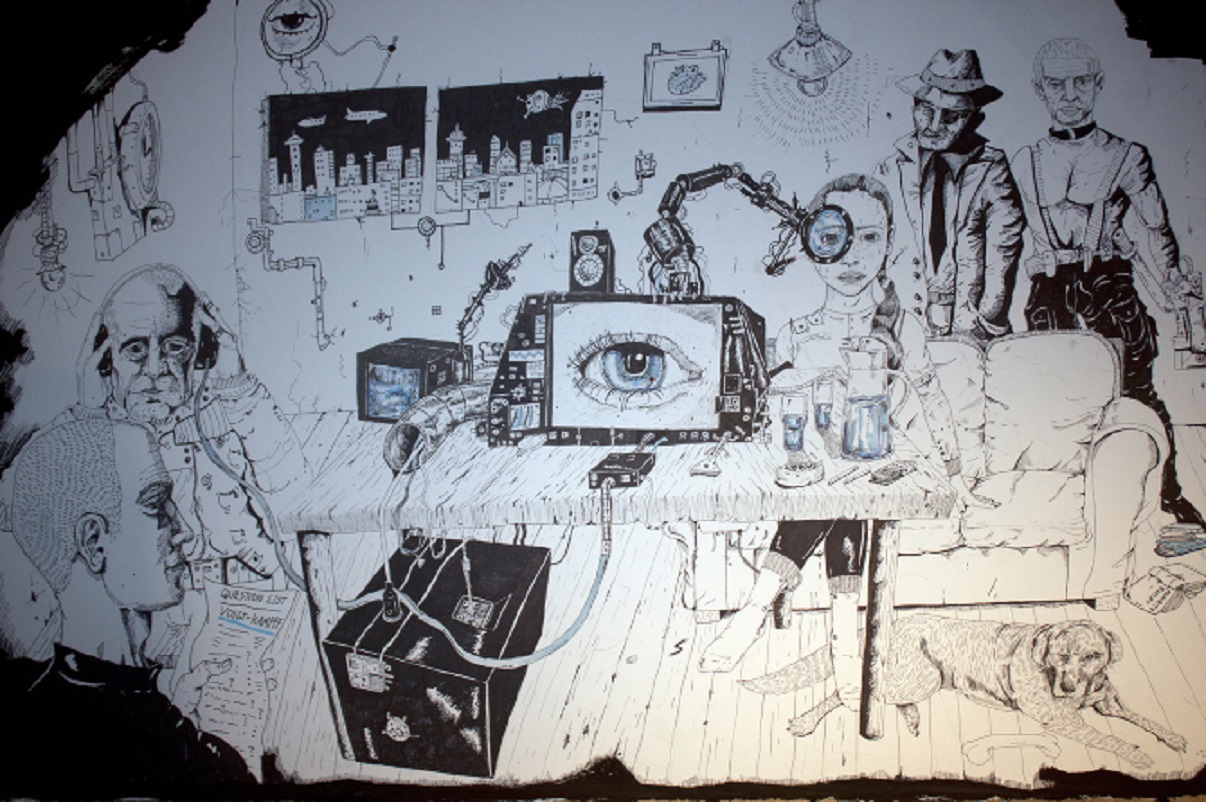Krishnamurti points out that ‘the controller is always the past’. The past is always reaching out and taking trying to control the present and we are always colluding with this process. When we are able to collude successfully then we feel secure and when we aren’t we start to feel fundamentally insecure – fear raises its head, anxiety sets in.
So what is all this about? What’s going on here? We feel secure when we are controlled by the past, but what is the past? Our history is the past, the narrative of who we are and what we think has happened to us is the past, but our history (our personal narrative) isn’t really us – it’s just a conglomerate of mechanical (or determining) factors that won’t let go of us!
To be controlled by the past to be forever trying to relive the past but even when we were ‘back in this past’ that wasn’t really us, that was of course just another past trying to live our lives. It’s always some kind of ‘past’ that’s is controlling us,. This being the case therefore, we have to ask again what exactly it is that we mean by ‘the past’?
The past is that which we are always trying to relive, in the belief that it is a real thing. If we couldn’t get on with the business of reliving it then we would be very afraid, very insecure – our ‘world’ would be in danger of coming to an end. The past is our world; it is the sphere within which we which we – as we understand ourselves – cannot exist outside of.
What we are forever trying to relive is problematic enough in its own right, however, as we have already intimated. What we are forever trying to relive is problematic because it isn’t actually ‘life’ and if it isn’t actually life in the first place then how can we possibly ‘relive’ it? How can we ‘relive’ something that we didn’t even live the first time round? The problem is therefore that the world that we can’t ‘exist outside of’ isn’t really ‘a world’.
There’s only one place that the world could be in and that isn’t the past! So whatever the past is that we are continuously trying to recreate (by projecting it into the present) it isn’t reality and it isn’t us either. It’s neither of these things. The controller is the past, as Krishnamurti says, and control is most important thing to us (no matter what else we may say to the contrary), but at the same time we are not in the past and neither is reality. So what is this ‘controlling’ all about?
What we are actually saying here is quite clear – the ‘controller’ isn’t real and the controller isn’t us! There is some unreal agency that is controlling us and yet – at the same time – being controlled by this unreal (or ‘abstract’) agency is the only thing that makes us feel safe, the only thing that makes us feel secure, the only thing that makes us feel that ‘everything is okay’. Controlling seems to be ‘our only friend’.
All of this – of course – sounds very strange from the point of view of the psychologically naïve listener – which is most of us. It’s beyond strange – it doesn’t make any sense at all. It’s crazy talk. How could we be controlled by something that isn’t real and isn’t us, never mind actually like being controlled by this alien entity? Never mind being actually being addicted to being controlled in this way? We couldn’t actually get as far as asking this question in the first place because we will dismiss the whole thing before getting to the stage to the stage of giving it any serious thought.
But suppose we weren’t totally psychologically naïve? What a psychologically naïve commentator has to say on the matter is neither here nor there, after all! If we did happen to have a bit of ‘genuine psychological sense’ – which is admittedly hard enough to get – then everything that we have so far said will fairly quickly start to make a lot of sense. It will all start to become crystal clear.
This ‘unreal agency’ that is controlling us – and which we are colluding with, conforming to, cooperating with, to the very best of our ability – is the ‘realm of thought’, the ‘realm of abstract representations’, the ‘realm of ideas’. Our primary delusion in everyday life is of course that we are thinking our thoughts deliberately, because we want to think them, because it is in some way advantageous for us to think them, but this perception – as David Bohm has pointed out – is only a convenient illusion that has been generated by our thoughts themselves: ‘Thought is the one who controls each one of us’.
Thought (which is to say, ‘the system of abstract representations’) can’t do anything else but control us. Thoughts are always definite, thoughts are always certain and so of course they are going to control us. They are going to make us conform to their assumed view of the world. What else could they do? They are going to control us just as long as we take them seriously. There can be no such thing as a thought that is not definite, a thought that is not certain, and it is only in the lack of certainty that freedom can exist. Inasmuch as we are averse to uncertainty therefore we are averse to freedom, and inasmuch as we are averse to freedom we are always going to want to be controlled by the deterministic agency of thought.
The extraordinary thing is that a plausible simulation of life is actually possible via this mechanism of ‘allowing ourselves to be controlled by the realm of abstract representations’. Or to put this another way, the extraordinary thing is that we can be engaged in this business of ‘trying to enact or recreate the past’ the whole time and yet this activity will seem like ‘life being lived’ to us, when reality this is not the case at all. Trying to re-enact or recreate a past that never actually existed in the first place is not and never can be ‘life’!
This is the point that is so hard to grasp (even though once we do see it, it makes perfect sense) – reasserting the past actually means denying the reality of the present. We are seeking to replace what is real with what is not real – what we call ‘the past’ isn’t real, it’s just a set of abstract representations, it’s just a bunch of ideas, in other words. Our allegiance to these ideas means that we will always give them preference over reality – this is our inescapable bias. It’s not just that we ‘give our ideas preference over reality’ either – it’s more that we are working flat-out to replace reality with our false ideas of it. We are working away as hard as we possibly can to substitute these ideas of ours for reality and we see this ‘striving’ of ours as being the same thing as ‘us trying to live our lives’.
What’s happening is that the ‘thought stream’ is continually reasserting itself and we have been enlisted in that task. That’s our job – to assist the thought-stream in asserting itself! So why does the ‘thought-stream’ want to keep on asserting itself, we might ask? And the answer is of course that there is no reason why the thought stream wants to keep on asserting and reasserting itself ad infinitum – that’s just what it does. The thought-stream insists on asserting itself, insists on substituting itself for reality, for the same reason that a stone rolls down a hillside – it’s just a mechanical process, it’s just energy dissipating itself or ‘running downhill’.
So when we conform to this process, when we get hijacked by it so our only concern is to constantly assert and reassert this thought flow, then we are serving this mechanical process. We are serving the mechanical process but at the same time we are dignifying what we are doing by implying (or assuming) that it is something non-mechanical that we’re doing. We have all of these ‘notions’ about what is being served and these notions tend to be very lofty, very noble, very inspirational. None of these lofty notions stand scrutiny of course, but then again we aren’t about to start scrutinising them! We not in the business of ‘scrutinising our assumptions’, we’re in the business of ‘seeking security’ and that’s a different kettle of fish entirely.
When we assume the point of view that is provided for us by the thought-stream then the cessation of that thought-stream seems like the worst, most terrifying thing ever. No catastrophe is greater. This is what the fear of death is all about – the loss of the loss of continuity of the thought-stream. This is equivalent to ‘the loss of the world,’ because the thought-stream is the only world that we know or can envisage. And yet the thought-stream is merely what we are substituting for reality – it is merely the ‘impoverished version of reality’ that we continuously preoccupy ourselves with and absorb ourselves in so as to prevent us from ever having to encounter the genuine article – ‘the real thing’ so to speak.
Everything is quite contrary to the way we think it is, therefore. We’ve already lost ‘that which is most precious’, and what we are protecting ourselves from by clinging to the thought-stream is becoming aware of this loss! Ironically, though, the moment we fail to protect ourselves from the painful awareness of our true situation is also the moment we start to recover what we have lost. To know that we have forgotten is to remember…
Art: ‘Preachings_Of_The_Sun_by_hrn’, taken from voidmirror.blogspot.com






